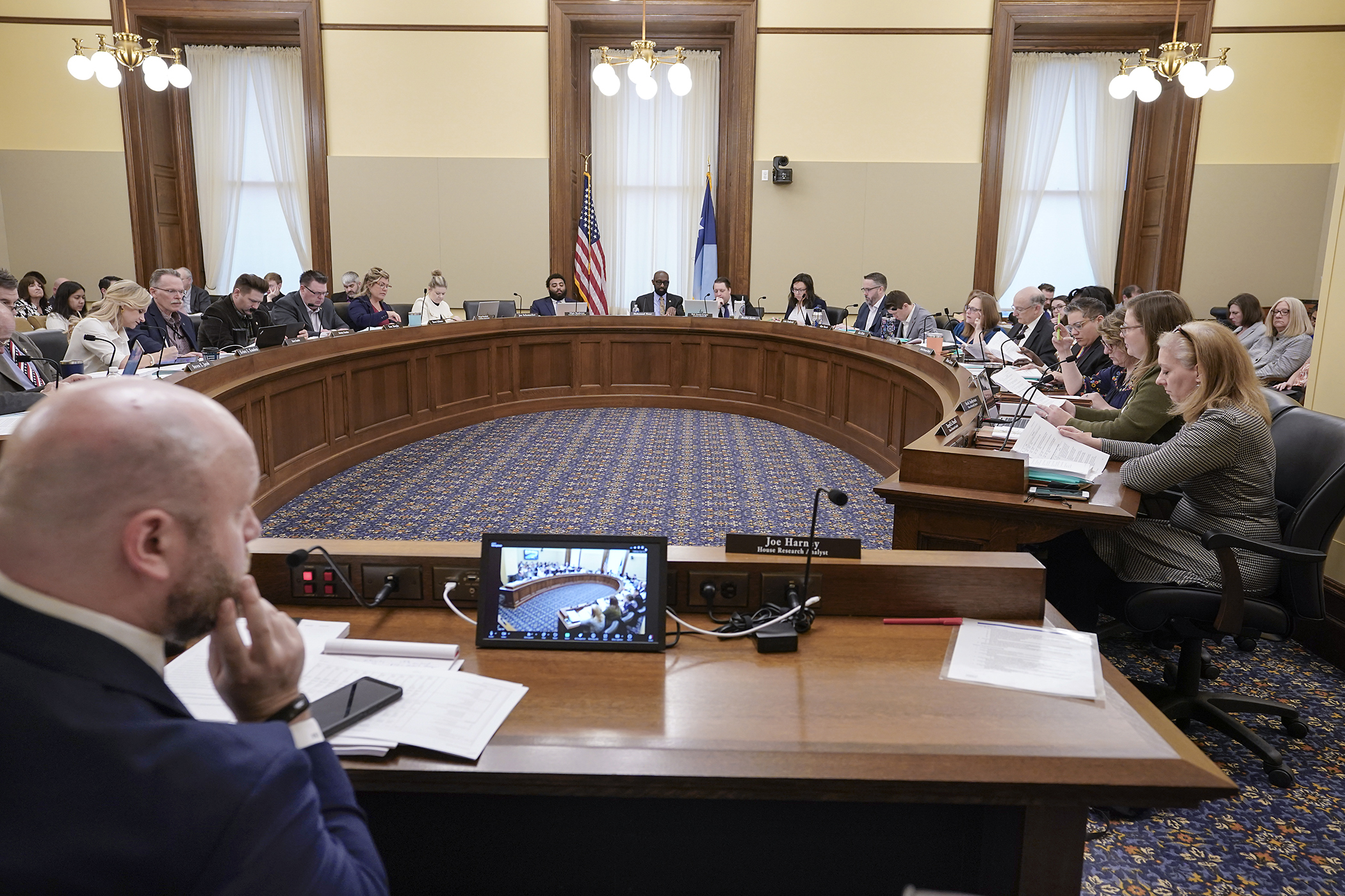Human services panel reviews potential $300 million in budget cuts

With the state’s darkening fiscal picture and a nearly $6 billion shortfall looming in three fiscal years, Minnesota lawmakers have begun to take action.
Increased human services costs are a big reason why the state’s financial outlook is bleak for the foreseeable future.
Checking in at nearly $18.54 billion, human services accounts for just under 28% of the 2026-27 biennial budget targets put forth by House leaders — and the largest reduction from February’s base of $300 million.
[MORE: House budget resolution tracking, including finance committee targets]
Sponsored by Rep. Joe Schomacker (R-Luverne), HF2434 is the omnibus human services finance bill.
“We got six days to put an entire budget together and we were given the historic cut to also deal with in this area,” Schomacker said. “This is phase one in an exercise to get to a final budget. I think that this is one area where we're not going to be happy with what we have in front of us exactly, but we're in a direction that we need to be going. This is not the course that we will be on, but this is the direction that we'll be taking.”
“We do have a $1.3 billion biennium challenge that we're going to address,” said Rep. Mohamud Noor (DFL-Mpls), who co-chairs the House Human Services Finance and Policy Committee with Schomacker. “It's not easy. Our goal is not to target programs or services. Our goal is to make sure that we can be able to provide services to the most vulnerable individuals, individuals with disabilities, our seniors and the promises for us to continue to work on this bill.”
The committee walked through a delete-all amendment Wednesday and heard from 43 public testifiers, many who questioned the proposed cuts. Committee action is scheduled Thursday.
[MORE: View spreadsheet]
Of the potential reductions in the bill are:
- $427.09 million in long-term care waivers;
- $371.57 million to the Department of Human Services operations;
- $162.23 million for Disability Waiver Rate System inflation adjustment;
- $154.66 million to county share for rate exceptions;
- $75.34 million to reduce Disability Waiver Rate System growth;
- $73.16 million for nursing facility surcharge;
- $66.76 million by removing the absence and utilization factor from Family Residential Services, Community Residential Services and Integrated Community Supports;
- $25.45 million for cancellations of Customized Living, SEIU retention bonus, 2023 Paid Family and Medical Leave appropriation;
- $16.48 million to eliminate Housing Support special rates;
- $10.69 million for Behavioral Health Fund reforms;
- $7.8 million by reinstating parental fees above 675% federal poverty level in the Tax Equity and Fiscal Responsibility Act; and
- $3.01 million by decreasing nursing level of care for Community Access Disability Inclusion/Brain Injury programs.
Proposed new spending includes:
- $95 million for direct care and treatment;
- $70.22 million for investments in community first services and supports;
- $20 million for a housing support supplemental rate bump;
- $18.08 million for modifying nursing facility payment rates;
- $11.67 million to program integrity investigation analytics infrastructure;
- $9.08 million for a substance use disorder rate increase;
- $9 million for additional funding for Homeless Youth Act grants;
- $7.24 million for detecting, preventing and addressing waste, fraud, and abuse;
- $6 million to maintain funding to end HIV;
- $5.37 million for Safe Harbor grants;
- $4.7 million for Waiver Reimagined delay;
- $3.5 million for senior nutrition programs;
- $2.76 million to improve supportive housing options; and
- $1.2 million to convert part of a Clay County juvenile center into an 18-bed psychiatric residential treatment facility for people under age 21;
- $1 million for dementia grants.
[MORE: Written Testimony: Part 1, Part 2, Part 3, Part 4, Part 5]
***
The following are selected bills that have been incorporated in part or in whole into the omnibus human services finance and policy bill:
- HF670 (Hicks)
- HF671 (Hicks)
- HF702 (Davids)
- HF728 (Hicks)
- HF973 (Backer)
- HF1166 (Curran)
- HF1380 (Keeler)
- HF1419 (Schomacker)
- HF1674 (Curran)
- HF1678 (Virnig)
- HF1831 (Zeleznikar)
- HF1894 (Virnig)
- HF1994 (Frederick)
- HF2038 (Schomacker)
- HF2060 (Nadeau)
- HF2068 (Keeler)
- HF2187 (Frederick)
- HF2212 (Fischer)
- HF2367 (Nadeau)
- HF2406 (Nadeau)
- HF2586 (Frederick)
- HF2704 (Curran)
- HF2707 (Keeler)
- HF2722 (Noor)
- HF2935 (Murphy)
Related Articles
Search Session Daily
Advanced Search OptionsPriority Dailies
Speaker Emerita Melissa Hortman, husband killed in attack
By HPIS Staff House Speaker Emerita Melissa Hortman (DFL-Brooklyn Park) and her husband, Mark, were fatally shot in their home early Saturday morning.
Gov. Tim Walz announced the news dur...
House Speaker Emerita Melissa Hortman (DFL-Brooklyn Park) and her husband, Mark, were fatally shot in their home early Saturday morning.
Gov. Tim Walz announced the news dur...
Lawmakers deliver budget bills to governor's desk in one-day special session
By Mike Cook About that talk of needing all 21 hours left in a legislative day to complete a special session?
House members were more than up to the challenge Monday. Beginning at 10 a.m...
About that talk of needing all 21 hours left in a legislative day to complete a special session?
House members were more than up to the challenge Monday. Beginning at 10 a.m...